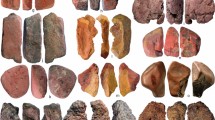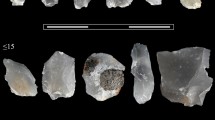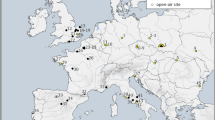Abstract
MY researches in East Anglia have demonstrated that palæolithic flint implements occur in the glacial Boulder Clays of this region, and that these deposits, and their contained artefacts, are of widely differing ages. Thus, in the Tills overlying the Cromer Forest Bed of Norfolk, have been discovered specimens of Chellean type,1 while, in what I term the Upper Chalky Boulder Clay of Suffolk, which appears to be separated from the Cromer Tills by a series of sands, gravels, and brick-earths, I have found specimens referable to Late Acheulean and to Early Mousterian times.2 Upon the surface of the Upper Chalky Boulder Clay in the Ipswich district are situated, at certain places, two superposed and ancient occupation-levels yielding implements of Upper Mousterian and of Aurignacian types, and these floors are covered by a considerable thickness of hill-wash which, some years ago, I correlated with the latest glacial conditions obtaining in Suffolk.3
This is a preview of subscription content, access via your institution
Access options
Subscribe to this journal
Receive 51 print issues and online access
$199.00 per year
only $3.90 per issue
Buy this article
- Purchase on Springer Link
- Instant access to full article PDF
Prices may be subject to local taxes which are calculated during checkout
Similar content being viewed by others
Rights and permissions
About this article
Cite this article
MOIR, J. Flint Implements of Upper Palæolithic Types from Glacial Deposits in Norfolk and Yorkshire. Nature 125, 234–235 (1930). https://doi.org/10.1038/125234b0
Issue Date:
DOI: https://doi.org/10.1038/125234b0
Comments
By submitting a comment you agree to abide by our Terms and Community Guidelines. If you find something abusive or that does not comply with our terms or guidelines please flag it as inappropriate.



